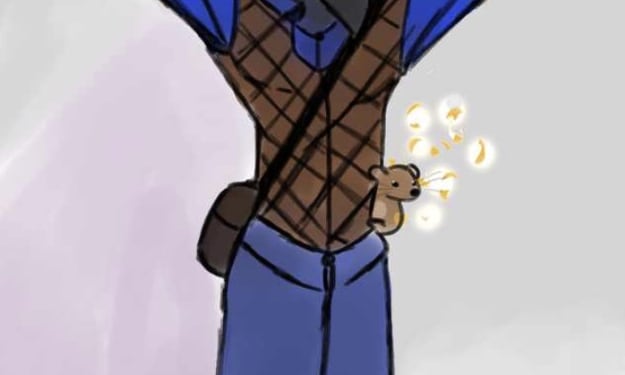Are We Truly Real?
Today we doubt our very existence and maybe the existence of everything else.

We are a real, living, breathing human being. This is probably a concept that you don't think much about because in our minds it's just a given. Humans are as real as this rock or that tree. But how do you know with certainty that what you are experiencing right now is really reality?
Of course one would argue this by saying that they know that this is reality because it feels so real. We interact with this world through our senses and though those senses discern whether something is real or if it's just an illusion. Or you know you're dreaming because things in your dream don't behave the way they should. Why can I walk through this wall? Grapes shouldn't be that large. Why is my son climbing on the ceiling and foaming at the mouth? It's things like this that let us know that his may not be reality.

Ruby Roman grapes from Japan that sold for $10,900 for 30 grapes.
However, let me ask you, have you ever had a dream that was so real that you've mistaken it for reality? Have ever had a dream that you just woke up from a dream and have already started your day thinking everything was normal then BAM you wake up? Up till you awoke from the dream you were truly convinced that you were actually experiencing reality weren't you? This a problem realized by philosophers and most notably Rene Descartes. A 14th-15th century mathematician and philosopher, Descartes is known mostly for his skepticism about all beliefs resulting in a term made just for him, Cartesian Skepticism. He was probably known for some math stuff too but that doesn't matter in this context. His obsession with finding truth stemmed from him realizing that a long held belief was actually false. This was concerning for him because if something he believed was actually false, then what else can be false? So to be sure that he only held true beliefs he got rid of all of his beliefs for if he couldn't be sure anything was true then he couldn't reasonably be sure any of them were true.
It should be known that according to Descartes and philosophers, the only way to have true knowledge of something is for the belief to be true and justified. This meaning that there is no possible way to cast any meaningful doubt upon the belief in question. So in order to do this took some time off from work and sorted through his beliefs deciding to work from the ground up. As a mathematician he believed that it would be impossible for one to dispute the basic laws of arithmetic such as 2+2=4 for what else could it be? "Wow, that was easy," Descartes probably thought to himself. Unfortunately it wasn't that easy because there was one problem with this. What if there was no god, but in fact a malicious demon actively deceiving everyone on the planet into believing what they believe. In other words, what if this evil demon was tricking us into believing 2+2=4 when in reality it equals 22 and those dastardly children with their jokes were right all along! Now while he had no proof for this he also didn't have any proof that it wasn't true making it a valid possibility. With this doubt he had no choice but admit that math wasn't a true belief. Be sure to tell your teachers kids. Descartes then went even simpler and asked if he could doubt his senses surely the sensations of smell and sight could save him! Can you guess what the problem was? If you guessed Evil Demon then you are correct! Descartes realized that if this Evil Demon could trick him into believing 2+2=4 then he could also trick Descartes into seeing things or believing that there is a world in front of him to sense!
Descartes was in shambles after this. How could he believe anything anymore! He has brought reasonable doubt to everything around him but one thing. Descartes began to realize that there was one thing that he can't give doubt to and that was that he was doubting. He realized that it is impossible to doubt that he is thinking and even the Evil Demon can't change that. Descartes realized that in order for this Evil Demon to be tricking him there needs to be something for the demon to trick. This results in the infamous saying "I think therefore I am." However, this doesn't bring our bodies back for we can still be tricked into thinking we have bodies. This also doesn't allow for the possibility of others existing either for that is something we can still be tricked into believing also. So now we know for certain that at the very least we, or you, are just a solitary brain floating in a void with a very bored Evil Demon.
So from one floating brain to another I hope you enjoyed this tidbit of philosophy. Next time we'll discuss oppositions to this and maybe we can progress to actually having bodies! If you enjoyed this article share it with your friends and mess with their brains. If you have questions or would like to discuss this let me know in Facebook comments or message me on there I love to hear back from readers. Thank you and see you all next time
About the Creator
Walt Duncan
Yet another person seeking answers about the world and the human experience, and I can write well. Bonus points!!






Comments
There are no comments for this story
Be the first to respond and start the conversation.